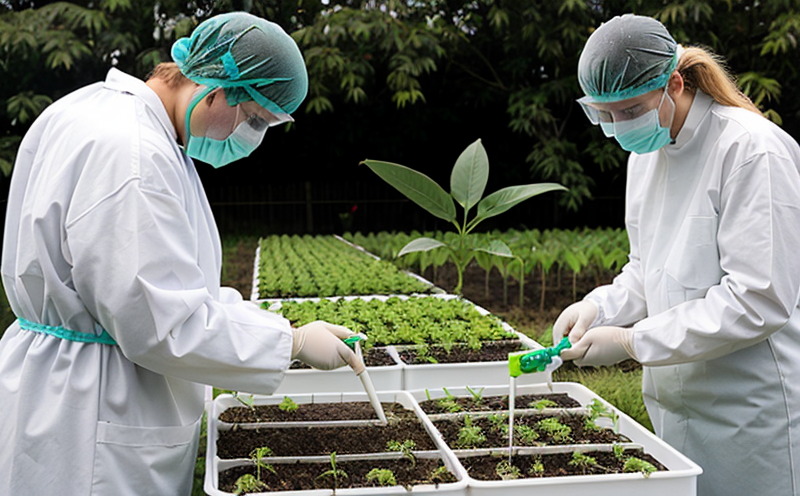Barley Yellow Dwarf Virus Testing
The Barley Yellow Dwarf Virus (BYDV) testing service offered by Eurolab is a critical tool in the management of plant diseases that can significantly impact agricultural yields. BYDV affects cereal crops, particularly barley, wheat, and oats, leading to stunted growth, yellowing leaves, and reduced grain quality and yield.
The virus is transmitted primarily through aphids, which act as vectors for its spread within fields and between farms. Early detection and management of BYDV are essential to minimize economic losses. Eurolab’s testing method ensures accurate and reliable results, helping stakeholders make informed decisions on crop health and pest control measures.
Our service is crucial for farmers, quality managers, compliance officers, and R&D engineers who need precise information about the presence or absence of BYDV in their crops. The test supports strategic planning for plant health programs, ensuring that affected areas are identified promptly to prevent further spread and reduce economic impacts.
The testing process involves several steps: sample collection from the field, transportation under controlled conditions, laboratory preparation, and finally, analysis using advanced virological techniques. Our experienced technicians use standardized protocols based on international standards such as ISO 15689-4 to ensure consistency and accuracy of results.
Once tested, the results are reported promptly, providing actionable insights for decision-making processes. This information can guide farmers in choosing appropriate fungicides or other treatments to manage BYDV effectively. Additionally, it supports compliance with regulatory requirements regarding plant health and ensures that agricultural products meet quality standards set by consumers and import regulations.
The importance of BYDV testing cannot be overstated, especially given the global demand for cereal crops. Accurate diagnosis enables targeted interventions, reducing unnecessary pesticide use while enhancing crop resilience against diseases. By leveraging Eurolab’s expertise in plant virology, stakeholders can protect their investments in agriculture and forestry effectively.
Our commitment to excellence ensures that every sample processed undergoes rigorous quality checks at multiple stages of the testing process. This dedication translates into reliable data that supports evidence-based decisions about crop health and management strategies.
Scope and Methodology
| Parameter | Description |
|---|---|
| Sample Type | Corn leaves or leaf blades, plant parts, or whole plants. |
| Virus Detection Method | Reverse Transcription Polymerase Chain Reaction (RT-PCR). |
| Sensitivity | Detection limit of 10 genome copies per reaction. |
| Specificity | Avoids cross-reaction with other viruses within the Luteoviridae family. |
The testing procedure begins with the collection of representative plant samples, followed by preparation for analysis. The collected material is transported to our laboratories under optimal conditions to maintain sample integrity during transit.
At the laboratory, technicians perform nucleic acid extraction from the provided specimens using established protocols. This step ensures that high-quality starting materials are available for subsequent testing. Next, we apply RT-PCR technology, which amplifies specific sections of the BYDV genome present in the extracted nucleic acids.
The amplified products undergo further analysis to determine their presence or absence according to predefined criteria. Positive samples indicate active infection by BYDV, whereas negative results suggest no detectable viral presence. All tests follow stringent quality control measures to ensure accuracy and reliability.
Eurolab Advantages
At Eurolab, we pride ourselves on delivering comprehensive services that go beyond mere compliance with regulations. Our expertise lies in providing clients with tailored solutions designed specifically for their unique needs within the agricultural sector.
- Comprehensive Services: From sample collection to final report generation, our team handles every aspect of BYDV testing.
- State-of-the-Art Facilities: Equipped with cutting-edge equipment and facilities, ensuring precise results.
- International Standards Compliance: Adherence to globally recognized standards like ISO 15689-4 guarantees consistent quality.
- Experienced Technicians: Our team comprises highly qualified professionals trained in the latest techniques for accurate diagnosis and reporting.
We understand that timely information is crucial when dealing with plant diseases. That’s why we strive to deliver rapid turnaround times without compromising on accuracy or precision. By partnering with Eurolab, clients gain access to expert knowledge and resources necessary for effective management of BYDV in their operations.
Why Choose This Test
- Precision: Utilizing advanced RT-PCR technology allows us to detect even trace amounts of BYDV, providing highly accurate results.
- Reliability: Our testing methods have been validated against international standards, ensuring consistent and dependable outcomes.
- Timeliness: Rapid sample processing ensures that you receive your reports promptly, enabling swift action if necessary.
In addition to these benefits, BYDV testing at Eurolab offers peace of mind knowing that you are taking proactive steps towards protecting your crops from this potentially devastating virus. Our services not only help in maintaining crop health but also contribute to sustainable farming practices by minimizing the need for excessive chemical intervention.





